OD Travel & Photos
Original blog post
Posted by
operaduets
at
Wednesday, December 27, 2017
0
comments
![]()
Labels: 12_December, 12-27, 2014, Elena Mosuc, GIUSEPPE VERDI, Hamida Kristoffersen, Ivan Magri, Judith Schmid, Leo Nucci, LUISA MILLER, Opera, Switzerland, Vitalij Kawaljow, Wenwei Zhang, Zurich
2006-11-25 Don Carlo (G. Verdi), Opernhaus Zurich
Elisabeth de Valois = Joanna Kozlowska
Eboli = Luciana d Intino
Tebaldo = Martina Welschenbach
Stimme von Oben = Eva Liebau
Don Carlo = José Cura
Posa = Leo Nucci
Filippo II = Matti Salminen
Grossinquisitor = Pavel Daniluk
Frate = Tomasz Slawinski
Lerma = Miroslav Christoff
Carlo Rizzi, conductor
Posted by
operaduets
at
Saturday, November 25, 2017
0
comments
![]()
Labels: 11_November, 11-25, 2006, Austria, DON CARLO, GIUSEPPE VERDI, Joanna Kozlowska, José Cura, Leo Nucci, Luciana d'Intino, Matti Salminen, Opera, Switzerland, Zurich
1998-10-18 Attila (Verdi), Opernhaus Zurich
Attila = Ruggero Raimondi
Ezio = Leo Nucci
Odabella = Mara Zampieri
Foresto = Boiko Zvetanov
Uldino = Miroslav Christoff
Leone, alter Römer
[Papst Leo I.] = Guido Götzen
Vladimir Fedoseyev, conductor
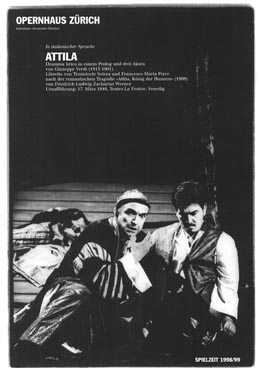
Attila at 20.00, during and after Andrea Chenier I had a bit of a head-ache, but to my amazement, I found out that a GREAT opera performance can cure that.
Ruggero Raimondi, was a great Attila, but Nesterenko was better in the video from Verona, I think. Mara Zampieri has the most beautiful voice, and sang the difficult and vocally demanding role of Odabella, in the most exquisite way. Leo Nucci was much better than I would have thought possible for him. Boiko Zwetlanov was as good as anyone singing Forest.
Inszenierung
und Bühnenbild ERWIN PIPLlTS
Kostüme ULRIKE KAUFMANN
Lichtgestaltung JÜRGEN HOFFMANN
Chor ERNST RAFFELSBERGER
CHOR DES OPERNHAUSES ZÜRICH STATISTENVEREIN AM OPERNHAUS ZÜRICH
ORCHESTER DER OPER ZÜRICH
Mit Unterstützung der Schweizer Rück als Hauptsponsor
sowie der Marion Mathys-Stiftung
Musikalische Einstudierung
und Assistenz LODOVICO ZOCCHE, KELLY THOMAS
Abendspielleitung
und Regieassistenz CLAUDIA BLERSCH
Regieassistenz LORENZ AGGERMANN
Regiehospitanz SUSANNE SCHMIDT
Kostümassistenz EBERHARD VON KNOBLOCH
Inspizienz PAUL SUTER
Souffleuse URSULA MORI
Sonntag, 18. Oktober 1998Sonntagabend-Abo A
Pause nach dem 1. Akt
Beginn: 20.00 Uhr Ende: ca. 22.10 Uhr
OD Travel
Posted by
operaduets
at
Wednesday, October 18, 2017
0
comments
![]()
Labels: 10_October, 10-18, 1998, ATTILA, Boiko Zvetanov, GIUSEPPE VERDI, Leo Nucci, Mara Zampieri, Opera, Ruggero Raimondi, Switzerland, Zurich
2004-10-10 Buon Compleanno Maestro Verdi, Teatro Regio Parma
Sopranos:
Elena Borin, Adriana Damato, Tiziana Fabbricini, Alessandra Rezza,
Mezzo: Alessandra Canettieri
Tenors:
Valter Borin, Luca Casalin, José Cura, Zvetan Michailov
Baritones:
Leo Nucci, Vladimir Stoyanov
Basses:
Franco De Grandis, Federico Sacchi, Riccardo Zanellato
Renato Palumbo, conductor
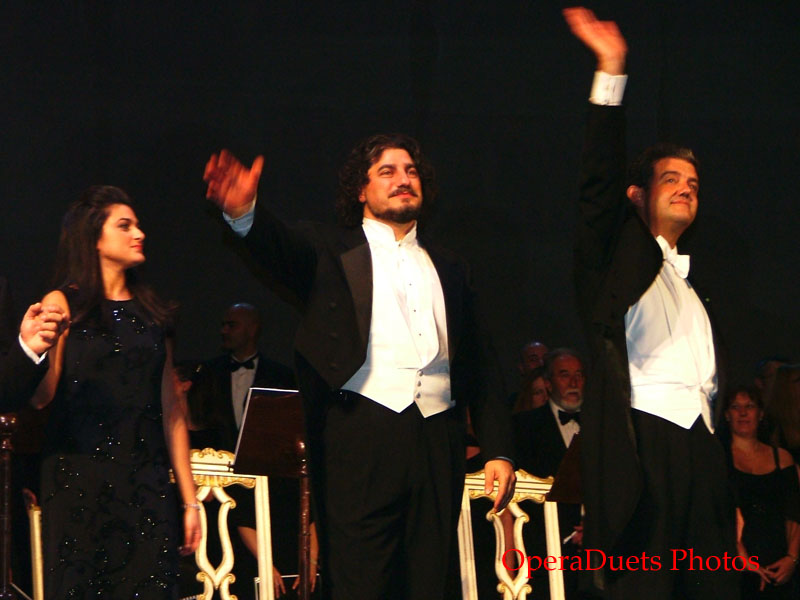
10 October 2004
Parma - Teatro Regio, 10 October 2004, at 20.30
excerpts from Giovanna d'Arco, Alzira, Attila, Macbeth,
I Masnadieri, Il Corsaro
Orchestra e Coro del Teatro Regio di Parma
Conductor Renato Palumbo
Regie Lorenzo Arruga
Actors Olga Gherardi, Giancarlo Giannini
Chorus Master Martino Faggiani
Audiovideo Dynamic s.r.l. DVD
Supported by Banca Popolare dell'Emilia Romagna
GIOVANNA D’ARCO
Tragic opera with a prologue and three acts on a libretto by Temistocle Solera, from Die Jungfrau von Orléans by Friedrich Schiller.
Première:
Milan, Scala Theatre, February 15th, 1845.
Sinfonia (ca. 7 minutes)
2 minutes: Olga Gherardi, Giancarlo Giannini
Prologo, Scena IV (6,5 minutes)
Oh ben s'addice questo... Sempre all’alba ed alla sera…
Giovanna - Adriana Damato, soprano
Adriana Damato sang this difficult opera aria with great passion. Her dark-hued voice has a very special appeal. She obviously knew this aria, she didn't need to use the notes. This aria is one that is hard to love at first hearing but then it is almost addictive. The passion, the early Verdi sound and this soprano voice was a perfect match.
1 minute: Olga Gherardi
Atto I, Scene III, IV (7,5 minutes)
Ho risolto… Dunque, o cruda, e gloria e trono... È puro l'aere - limpido il cielo
Giovanna - Adriana Damato, soprano
Carlo - Jose Cura, tenor
chorus
A tenor and soprano both with a dark hue in their voices. Passionate duet. Perfect together. The only thing that I missed during the whole concert was more acting and interacting, not just standing there and singing gloriously. Not a fault of Jose Cura. I simply loved È puro l'aere - limpido il cielo.
2,5 minutes: Olga Gherardi, Giancarlo Giannini
ALZIRA
opera with a prologue and two acts on a libretto by Salvatore Cammarano, from Alzire ou les Américains by Voltaire
Première: Naples, San Carlo Theatre, August 12th, 1845.
Atto I, Scena VIII (5 minutes)
Nella polve genuflesso…
Gusmano - Vladimir Stoyanov, baritone
Alvaro - Franco De Grandis, bass
Alzira - Tiziana Fabbricini, soprano
Zamoro - Valter Borin, tenor
Ataliba - Federico Sacchi, bass
Zuma - Alessandra Canettieri, mezzo
chorus
Great voices. Franco de Grandis fabulous, Vladimir Stoyanov glorious, Valter Borin wonderful beautiful tenor voice. And the ALZIRA, Tiziana Fabbricini very special soprano voice; the sound of her voice is edgy but it is warm when you come into center of the voice. She shines though this wonderful scene.
Atto I, Scena VIX (5 minutes)
Qual suon?...Che avvenne?... Trema, trema... a ritorti fra l'armi
Gusmano - Vladimir Stoyanov, baritone
Alvaro - Franco De Grandis, bass
Alzira - Tiziana Fabbricini, soprano
Zamoro - Valter Borin, tenor
Ataliba - Federico Sacchi, bass
Zuma - Alessandra Canettieri, mezzo
Ovando - Luca Casalin, tenor
chorus
The same great voices with Luca Casalin in the comprimario role of Ovando.
Atto II, Scena III (8 minutes)
Per chi? - Per me. S' ei muore, io moro...Il pianto, l’ambascia…
Atto II, Scena IV: Di pira non più, ma d'ara, e talamo
Alzira - Tiziana Fabbricini, soprano
Gusmano - Vladimir Stoyanov, baritone
Ovando - Luca Casalin, tenor
Wonderful duet, I think it is Tiziana making it so divine, wonderful. But of course, the baritone is good too. Her sound is just right for Alzira, especially in this duet
Atto II, Scena VI (7,5 minutes)
Miserandi avanzi… Irne lungi ancor dovrei... Non di codarde lagrime
Zamoro - Zvetan Michailov, tenor
Otumbo - Luca Casalin, tenor
chorus
Another tenor as Zamoro. Zvetan Michailov's tenor is darker than Borin's, more muscular. Irne lungi ancor dovrei... is a wonderful aria. After these excerpts I think that ALZIRA must be a wonderful opera, at least that the music is great.
2,5 minutes: Olga Gherardi, Giancarlo Giannini
ATTILA
Opera with a prologue and three acts on a libretto by Temistocle Solera, taken from Attila re degli Unni by Zacharias Werner.
Première: Venice, La Fenice Theatre, March 17th, 1846
Prologo, scena III (7,5 minutes)
Di vergini straniere…Allor che i forti corrono...Da te questo or m'é concesso
Odabella - Alessandra Rezza, soprano
Attila - Riccardo Zanellato, bass
Aldino - Luca Casalin, tenor
chorus
The great aria of Odabella is wonderfully sung by Alessandra Rezza. Allor che i forti corrono.... Great applause and BRAVA!!!
Prologo, scena III (8,5 minutes)
Uldino, a me dinanzi...
Prologo, scena IV: Attila!-Oh, il nobil messo!
Prologo, scena V
La destra porgimi. . . Tardo per gli anni, e tremulo…
Attila - Riccardo Zanellato, bass
Ezio - Leo Nucci, baritone
One of great joys of ATTILA is these wonderful duets. Riccardo Zanellato is great as Attila but it is Leo Nucci who is the man. Tardo per gli anni, e tremulo… is wonderfully sung. (Avrai tu l'universo, Resti l'Italia a me.)
Prologo, Scena VII (5 minutes)
Quai voci! Oh, tutto... Qui, qui sostiamo!… Ella in poter del Barbaro!
Foresto - Jose Cura, tenor
chorus
One of the highlights of the concert. Jose Cura is just marvelous as Foresto.
Ella in poter del Barbaro is just wonderful, never knew it was such a wonderful aria before I heard Jose Cura sing it!!!! BRAVO!!
Prologo, Scena VII (4 minutes)
Cessato alfine il turbine... Cara patria, già madre e reina
Foresto - Jose Cura, tenor
chorus
Jose Cura sang Cara patria, già madre e reina with his dark passion.
Atto II scena I (5 minutes)
Tregua è con gli Unni…Dagli Immortali vertici
Ezio - Leo Nucci, baritone
The other great man in this concert was Leo Nucci who was simply the greatest as Ezio. I saw Leo Nucci as Ezio in Zurich in 1998. He was wonderful. But in 2004 he is better than in 1998. BRAVO!!!!
Atto II scena II (5,5 minutes)
Chi vien?... Salute ad Ezio
Atto II scena III: Che brami tu?
Atto II scena IV: È gettata la mia sorte
Ezio - Leo Nucci, baritone
Foresto - Valter Borin, tenor
chorus
Another Foresto, good, but no Jose Cura. Leo Nucci È gettata la mia sorte. Grandissimo!!!
PAUSE ( 25 minutes)
2 minutes: Olga Gherardi, Giancarlo Giannini
MACBETH
Opera in four acts on a libretto by Francesco Maria Piave, from William Shakespeare's tragedy of the same name.
Première: Florence, Pergola Theatre, March 14th, 1847.
Atto I, Scena V (9,5 minutes)
Nel dì della vittoria…
Atto I, Scena VI: Al cader della sera il Re qui giunge
Atto I, Scena VII: Duncano sarà qui?...qui? qui la notte?...Vieni T’affretta!...
Lady Macbeth - Alessandra Rezza, soprano
un servo - Federico Sacchi, bass
Wonderful soprano voice. Passionate rendition of the aria, but I miss the ugly, dangerous sound when she sings "Duncano sarà qui?...qui? qui la notte?". It is too beautiful sung, that is true Lady Macbeth singing.
1 minute: Giancarlo Giannini
Atto I, scena XVI (8 minutes)
Di destarlo per tempo il Re m'impose
Atto I, scena XVII: Oh, qual orrenda notte!
Atto I, scena XVIII: Orrore! orrore! orrore!
Atto I, scena XIX: Schiudi, Inferno, …
Macbeth - Leo Nucci, baritone
Lady - Tiziana Fabbricini, soprano
Banquo - Riccardo Zanellato, bass
McDuff - Valter Borin, tenor
una dama - Elena Borin, soprano
First Macduff, then a short Banquo scene (beautiful singing by Riccardo Zanellato), then Macduff has found the old king dead, killed. Wonderful singing by the ensemble. Beautiful a-capella parts. Tiziana is a wonderful Lady with her Macbeth (Leo Nucci). Leo Nucci and Tiziana Fabbricini really enjoyed being the couple Macbeth.
0,5 minute: Olga Gherardi
Atto IV Scena V (6,5 minutes)
Perfidi…! Pietà rispetto, amore,…
Macbeth - Leo Nucci, baryon
Leo Nucci is fabulous in all scenes and arias. Only one small thing he sings "honore" when it is "amore", Pieta, rispetto, amore. Otherwise it is just stupendous.
Atto IV Scena VI: (8,5 minutes)
E' morta la Regina!
Atto IV Scena VII: Sire! ah, Sire!
Atto IV Scena VIII: Via le fronde, e mano all'armi!
Atto IV Scena IX: Carnefice de' figli miei, t'ho giunto.
Atto IV Scena X: Infausto giorno!
Atto IV Scena XI: Ove s'è fitto l'usurpator?... Salve, o re!
Macbeth - Leo Nucci, baryon
Malcolm - Luca Casalin, tenor
McDuff - Valter Borin, tenor
una dama - Elena Borin, soprano
chorus
Leo Nucci shines, great chorus. Unfortunately the orchestra has trouble in being together in Act IV scene IX, the announcement of Macduff coming is fuzzy, disorderly, embarrassing. But it comes together in the end.
3,5 minutes: Olga Gherardi, Giancarlo Giannini
I MASNADIERI
Opera in four acts on a libretto by Andrea Maffei, from the tragedy Die Räuber by Friedrich Schiller.
Première: London, Her Majesty's Theatre, July 22nd, 1847.
Parte I, scena III (10,5 minutes)
Vecchio! Spiccai da te… La sua lampada vitale…
Parte I, scena IV: Signor, che volete?
Parte I, scena V: Fra poco, Francesco, sarai qui signore!
Franceso - Leo Nucci, baritone
Armino - Luca Casalin, tenor
What can anyone say about Leo Nucci, he is a miracle...
Parte II, scena VI (6 minutes)
Come splendido e grande… Di ladroni attornato…
Parte II, scena VII: Capitano! noi siamo cerchiati. . .
Carlo - Zvetan Michailov, tenor
Rolla - Luca Casalin, tenor
chorus
Zvetan Michailov sings this aria wonderfully.
Parte III, scena II (7 minutes)
Qual mare, qual terra da me t'ha diviso?
Amalia - Adriana Damato, soprano
Carlo - Valter Borin, tenor
Wonderful duet, Valter Borin and Adriana Damato is just perfect together.
1,5 minutes: Olga Gherardi, Giancarlo Giannini
IL CORSARO
Tragic opera in three acts, on a libretto by Francesco Maria Piave, taken from The Corsair by George Byron.
Première: Trieste, Teatro Grande, October 25th, 1848.
Atto I scena II (6,5 minutes)
Tutto parea sorridere…
Atto I scena III: Della brezza col favore...
Corrado - Jose Cura, tenor
Giovanni - Federico Sacchi, bass
chorus
I have heard Jose Cura sing the aria "Tutto parea sorridere" before even more beautiful than here in Parma but is was wonderful with the chorus and Federico Sacchi as Giovanni, Corrado's second in command on his pirate ship.
Atto I scena IV (6 minutes)
Egli non riede ancora!...Non so le tetre immagini…
Medora - Adriana Damato, soprano
Adriana Damato sang this aria .... que possa dire... I loved it. Only one regret, how I would have loved to hear the Corrado/Medora duet from act 1 with Cura and Damato, or the Corrado/Gulnara duet from act 2 with Jose Cura and Adriana Damato. That would have been something to die for...
2,5 minutes: Olga Gherardi, Giancarlo Giannini
Atto II, scena X (14 minutes)
Si risparmi quell'uom
Corrado - Jose Cura, tenor
Gulnara - Alessandra Rezza, soprano
Seid - Vladimir Stoyanov, baritone
Giovanni - Federico Sacchi, bass
Selimo - Luca Casalin, tenor
How is it possible to be disappointed with this great wonderfully sung scene from Il Corsaro. It just so happens that I know that there is even more beautiful scenes in this opera that I would rather hear;
like
ATTO PRIMO
SCENA V
Medora e Corrado.
CORRADO
È pur mesto, o Medora, il canto tuo
ATTO TERZO
SCENA ULTIMA
Medora, Corrado e Gulnara con alcuni Corsari.
CORRADO E MEDORA:
Ah quest'amplesso è balsamo
But all is not lost I will see/hear the whole opera in Barcelona, February 2005
Happy Birthday, Maestro Verdi!!!
Most wonderful Verdi concert!!
Magic in Parma!!!!!!!!!!!!!
OD Travel + Photos
Posted by
operaduets
at
Tuesday, October 10, 2017
0
comments
![]()
Labels: 10_October, 10-10, Adriana Damato, Concert, Federico Sacchi, Franco di Grandis, Italy, José Cura, Leo Nucci, Parma, Valter Borin, Vladimir Stoyanov, Zvetan Michailov
2004-10-07 Stiffelio (Verdi), Opernhaus Zurich
Stiffelio = José Cura
Lina = Emily Magee
Stankar = Leo Nucci
Raffaele = Reinaldo Macias
Jorg = Günther Groissböck
Federico di Frengel = Martin Zysset
Dorotea = Margaret Chalker
Stefano Ranzani, conductor
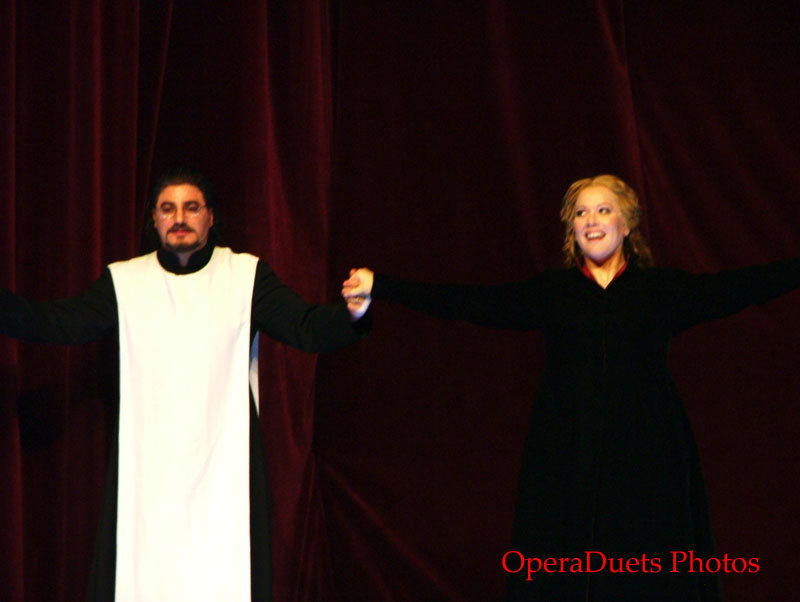
Since I saw this opera production at the premiere on Sept 26th I didn't expect to be surprised. The most important first, this time I did not get the feeling that Stiffelio forgave his wife. It was only the priest, the man did not forgive anything. The women's sin was not the kind that were forgiven, but that a brother would forgive a brother was expected as natural. Indulgira... But Honor was more important than Lina's soul and her happiness was counted for nothing. This time that was very evident.
Stiffelio (Jose Cura) was from the very beginning of the opera he wants his wife to love him to touch him but he is not willing to love her, touch her himself. All the, Non ha per me un accento non un sguardo, but it was he who was not talking to her, looking to her. She was all his. His very unchristian "only a heart that is not
hurt can forgive", where as the Christian sentiment is the forgive another that have hurt you, that is in a way the essence of Christianity. Jose Cura's Stiffelio is very dual, he brings love to the world. but not to his wife. His anger is dangerous even the lethal kind. But he is known as generosity himself, of course again not including his wife. Suspicious to his wife all from the beginning of the opera, he never did understand her love. And when Lina is about to confess he is never interested in how did Lina get involved in Raffaele de Leuthold, it is just enough that she says he
was seduced and he jumps at the possibility to kill Raffaele in a duel. Not a thought of Lina and her predicament.
Stankar (Leo Nucci) the same honor-driven madness and little love and caring for Lina, his daughter. The same selv-pity, Lina pensai che angelo. He thought Lina was only there to make him proud, and make him important.
Lina (Emily Magee) the adulterous wife of a priest. Always searching forgiveness, and always Stiffelio, Stankar and Raffaelle getting in the way for forgiveness and happiness. Her hands always searching for Stiffelio's hand for support and love. And in the end God's forgiveness is pronounced in public with Stiffelio as Priest reading
from the Gospels about "the one without sin can throw the first stone".
It was wonderful sung and acted and I do love this opera but I still like the Moshinsky production best as I saw it on video with Jose Carreras from Royal Opera House, Covent Garden.
But this is a great role for Jose Cura.
I took some marvelous photos from Zurich. Unfortunately I tried my luck at one of Zurich's internet-cafe, and a whole memory card of 128 MB was then not usable again of the many photos 26 of what I think was my best Stiffelio photos. Luckily for me I had bought a new one, and my last 4 photos was on my new memory-card.
OD Travel + Photos
Posted by
operaduets
at
Saturday, October 07, 2017
0
comments
![]()
Labels: 10_October, 10-07, Emily Magee, GIUSEPPE VERDI, José Cura, Leo Nucci, Opera, Reinaldo Macias, STIFFELIO, Switzerland, Zurich
2004-09-26 Stiffelio (Verdi), Opernhaus Zurich
Stiffelio = José Cura
Lina = Emily Magee
Stankar = Leo Nucci
Raffaele = Reinaldo Macias
Jorg = Günther Groissböck
Federico di Frengel = Martin Zysset
Dorotea = Margaret Chalker
Stefano Ranzani, conductor
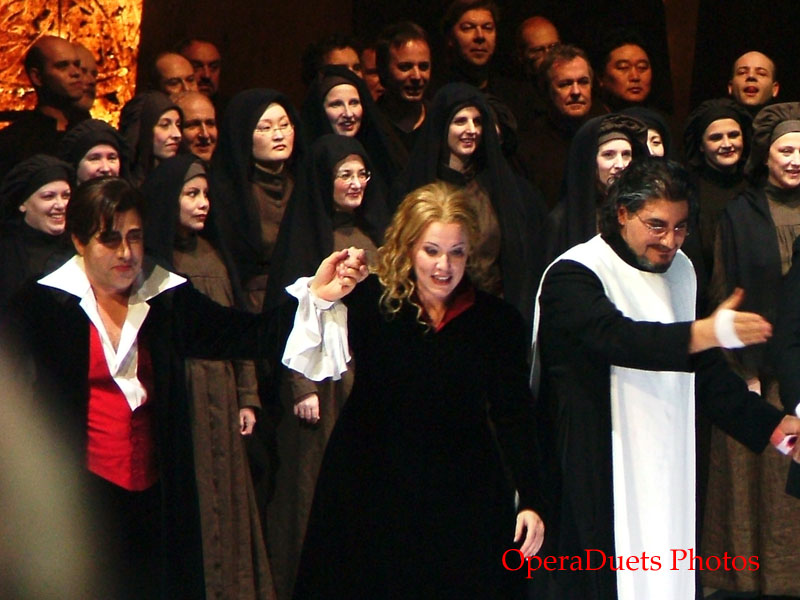
Sunday, 26. September 2004
For the first time in Opernhaus Zürich
Sung in Italian with German surtitles
Stiffelio
Dramma lirico in 3 Acts by Giuseppe Verdi (1813-1901)
Libretto by Francesco Maria Piave after the Drama
«Le Pasteur ou L'Evangile et le foyer» (1849) by
Emile Souvestre and Eugène Bourgeois
First performance:
Trieste, Teatro Grande, 16 November 1850
Conductor Stefano Ranzani
Regie Cesare Lievi
Scenography Csaba Antal
Costumes Marina Luxardo
Chorus Ernst Raffelsberger
First time I saw Stiffelio was in 1997 when Brazilian tenor Antonio Lotti sang instead of Carreras.
ACT 1
Track 1: Stiffelio : Overture (ca. 09:57)
The conductor Stefano Ranzani conducted the Overture/Sinfonia in an OK way. This is one of Giuseppe Verdi's best opera-opening-pieces.
Track 2: Stiffelio : "Oh santo libro" (02:30)
Günter Groissböck (Jorg) sat at the table with a big book. For me it was obvious that it is the Holy Bible as he sang (santo libro = holy book). Jorg was alone, then Jose Cura (Stiffelio) came with Lina, his wife and his followers behind him. Stiffelio seemed to be immersed in himself, hand-shaking with his friends or sect members not in a way of man who cares and have longed for his friends. (He has been on missionary trip). His meeting with Lina (Emily Magee) is awkward, they don't seem to be able to touch each-other of be close, they want to but they can't. Dorotea, Lina cousin (Margaret Chalker) a bit gossipy, tells of a man who wanted to speak to Stiffelio. It is Walter, a boatman who has recently seen something strange.
Track 3: Stiffelio : "Di qua varcando"/"Son quanti giorni?" (02:13)
8 days ago Walter saw a young man and a young woman, they were in distress. In the end the young man jumped into the water, but he lost some papers. It was Raffaele, the young nobleman (Reinaldo Macias) who lost Lina's love letters. It is quite typical that Stiffelio thinks he has the right to tell this people what Walter has seen, since Walter did not forbid it. But I would think that the priest should know that Walter is not the one who is at stake here it is the young couple. Jose Cura and the orchestra is not entirely together here, when the aria becomes an ensemble it gets together again quite beautifully.
Track 4: Stiffelio : "Colla cenere disperso" (02:25)
The priest Stiffelio decide that the papers is to be burnt. It is open fire on the stage.
Colla cenere disperso
Sia quel nome e quel delitto;
Dio lo disse, Dio l'ha scritto:
Al fratel s'indulger.
The relief is great, and the admiration of the priest's godliness. Lina expresses her will to never sin again. But Raffaele want to meet Lina again, she doesn't want that
Track 5: Stiffelio : "Viva Stiffelio!" (03:22)
The sect members come in to celebrate Stiffelio. Stiffelio wants them only to sing praises of God. Lina is tormented by her sin, and the celebration of Stiffelio status as the great pastor.
Track 6: Stiffelio : "Non ha per me un accento" (01:56)
Stiffelio and Lina is alone. He longs for her to talk to him. But this Stiffelio is not very accommodating, I think. Lina sings of how they met and that she still has trouble calling him Stiffelio. He was called Rodolfo Müller when they met. He used a pseudonym.
Track 7: Stiffelio : "Vidi dovunque gemere" (04:04)
Stiffelio was alone and unhappy when he was away, and everywhere he went he saw the sins of people. Especially that women, who was breaking the holy matrimony.
STIFFELIO:
Le ingenue
Custodi del pudore,
Le donne, rotto il vincolo
Del coniugale amore . . .
Lina believes that Stiffelio has a great heart and would forgive, but no... He says it is not possible... (and they are just discussing the idea of forgiveness at this point)
LINA:
È grande la vost'anima,
Avrebbe perdonato.
(Lina si confonde)
STIFFELIO:
Ah no, il perdono facile
Al core non ferito;
Ma occulto sta nell'anime
Tesoro indefinito,
Che nulla mano infrangere
Impunemente può.
This makes Lina unhappy. The husband tries to comfort her. It is the anniversary. But the ring is missing....
Track 8: Stiffelio : "Ah! v'appare in fronte scritto" (02:17)
Jose Cura as Stiffelio is furious. In a very threatening position he hangs over Lina. Then Stankar comes in, Stiffelio is wanted elsewhere. In a threatening voice, "Soon I will be back!!!"
Track 9: Stiffelio : "Tosto ei disse!" (03:47)
Emily Magee's voice is simply a dream listening too. She is really Lina. In this aria. She tries to decide what to do, to say, to write. Yes, she starts writing a letter to Stiffelio ("Stiffelio, I am no longer worthy of your love")
Track 10: Stiffelio : "Verrà! Dovrò risponder!" (01:32)
Then Stankar, her father comes in. Stankar (Leo Nucci) has been spying on his daughter. He suspect that she writing to Leuthold (Raffaele), but even worse from his side, she is trying to confess to Stiffelio. Where Lina wants forgiveness, Stankar want that the stain on his honor should be unnoticed by the outside world. He forces Lina to give into his plan of never letting Stiffelio know of this.
Track 11: Stiffelio : "Dite che il fallo a tergere" (01:10)
Track 12: Stiffelio : "Ed io pure in faccia agli uomini" (03:07)
STANKAR:
Ed io pure in faccia agli uomini
Dovrò l'ira soffocare,
La vergogna dovrò vincere,
Voi mia figlia ancor nomare;
Voi, l'indegna che disprezzo,
Voi, del padre disonore.
Track 13: Stiffelio : "Or meco venite" (03:10)
Track 14: Stiffelio : "M'evitan" (00:52)
The same book that Jorg was reading in and called "santo libro" is now Klopstock Messiah. Raffaele has just written a note to Lina and locked the book when Federico di Frengel comes in and wants the book. And then a backdrop, drops down. Was it is mishap, or was it supposed to happen.
Track 15: Stiffelio : "Plaudiam" (03:18)
It does strike me as strange that Stiffelio should be sitting a desk looking at a miniature of the church this sect is going to build, looking at architect plans, and that that the chorus is on the galleries. He is mentally not there. Jorg came in, he is not for this kind of parties, but neither can Stiffelio be... Sitting down, I don't get this... Jorg is interested, however in telling Stiffelio about a note in a book, some intrigue, something sinful, no doubt. But since Federico now has the book, he is thought to be the guilty one.
Track 16: Stiffelio : "Cugino, pensaste al sermone?" (02:06)
Dorotea is asking Stiffelio (or Federico),are you thinking about the sermon, Federico answers, that they will all be there and ask Stiffelio what will be the subject. Judas, the traitor.
STIFFELIO:
Non solo all'iniquo ch'ha il Maestro venduto,
Ma a quanti tradiscon m'udrete imprecare
A lui che s'insinua, che simula astuto,
Che insidia, che macchia il domestico lare;
Che stende la mano all'uomo ingannato,
E infame poi vanta l'onore involato! . . .
A lui per anatema fia sol ch'io ripeta
Il carme ispirato del grande poeta . . .
He is so furious, Stiffelio, that all is taken aback, especially Federico who doesn't know why he is singled out.
Track 17: Stiffelio : "Oh qual m'invade ed agita" (03:02)
Stiffelio takes the book from Federico. Of course it was Dorotea who told that Lina has the key to this book. And suddenly, Stiffelio is getting very insecure about what is going to happen.
Track 18: Stiffelio : "Nol volete" (02:49)
Stiffelio opens the book with his bare hands. The letter flies out. Stankar almost leaps to get the note. Stiffelio is beside himself of fury. Stankar and Raffaele is going to meet at the church yard.
ACT 2
Track 1: Stiffelio : "Oh cielo! dove son io" (03:40)
Suddenly Lina sees her mother grave, she is devastated.
Track 2: Stiffelio : "Ah, dagli scanni eterei" (03:43)
Lina sings that her mother must intercede, so that she can be forgiven. This is one of the most beautiful soprano arias that Verdi wrote, and Emily Magee sings it wonderfully....
Track 3: Stiffelio : "Perder dunque voi volete" (02:40)
Then there is a duet with Raffaele. Somehow in this production I do not get so a confused Lina as Malfitano in the Moshinsky production. Here Lina's feeling is that she is definetely through with Raffaele. All she want him to do is to give back her letters, the ring and other incriminating thing. And that he would not destroy her life, her marriage. He doesn't want to back out.
Track 4: Stiffelio : "Io resto"/"Qual rumore" (03:07)
Lina's father is there, she must go. Finally after many insults, Stankar gets Raffaele in the dueling mode. Then Stiffelio comes.
Track 5: Stiffelio : "Santo è il loco" (02:21)
Stiffelio reminds them that they are on holy ground.
Santo il loco che sì profanate . . .
I sepolcri col piede premete,
Sopra il capo la croce vi sta!
It is the minister talking. They are not willing to stop now. Then Stiffelio asks Raffaele as the younger to give up the sword. They shake hands, Stankar is outraged, taking the hand of the man you have deceived. And now Lina comes.
Grazia! Grazia! Rodolfo!
It was Lina & Raffaele.
Track 6: Stiffelio : "Ah no, è impossibile" (03:09)
Jose Cura, in the photos in the program we see him hold the sword egg with his bare hand, but there is some rag in between. on the premiere, nothing protects his hands... And I am not sure he noticed it because we was so much Stiffelio.
Track 7: Stiffelio : "Dessa non è" (05:05)
Stankar reminds Stiffelio that she is not the only guilty one, now the priest is an outraged husband who want to duel with the seducer. Raffaele seem to have a change of mind, is willing to take his penalty but not to fight his minister. Jorg comes out. Reminds Stiffelio that he is a priest after all, and there is a sermon...
STIFFELIO:(come in delirio)
Me disperato abbruciano
Ira, infernal furore,
Tranquilli la man gelida
Voi mi gravate al core . . .
Ah fate prima ch'ardermi
Le vene cessi il sangue,
E la virtù che langue
Sar più forte in me! . . .
Lasciatemi, lasciatemi . . .
Tutto il mio cor perdé.
...
JORG:(sale sui gradini)
Da questa croce agli uomini
Ha Cristo perdonato . . .
Stiffelio faints with his hands round the cross, his bloody hand makes mark on the tree. It almost look like STIGMATA.
ACT 3
Track 8: Stiffelio : "Ei Fugge" (02:45)
This is Leo Nucci's great scene. And the only truly thunderous applause of the day is for Leo Nucci. He is simply stunning as Stankar. Stankar has decided for suicide since Raffaele has runaway. Death for Stankar. He is really sorry for himself.
Track 9: Stiffelio : "Lina, pensai che un angelo"/"Ah, si finisca" (03:47)
But the Jorg tells that Raffaele is back. What a joy....
Track 10: Stiffelio : "In questo tetto uno di noi morrà" (02:15)
A change to kill Raffaele, and sort of redeem his honour. (nonsense)
Great applaud for Leo Nucci
Track 11: Stiffelio : "Dite ai fratei che al tempio"/"Inevitabil fu questo colloquio" (02:43)
Raffaele who expect revenge is simply asked what would you do if Lina was free. But Lina is told that this marriage is breakable since Stiffelio called himself Rodolfo at that time.
Track 12: Stiffelio : "Opposto è il calle" (04:55)
I guess Stiffelio think he is generous, a divorce, Lina can marry Raffaele, the man he thinks she loves. She is not given any chance to tell what happen, or why, nor is he reflecting FORGIVENESS.
Track 13: Stiffelio : "Non allo sposo volgomi"/"Egli un patto proponeva" (04:03)
LINA:
Il vo'!
Non allo sposo volgomi,
Ma all'uom del Vangelo.
Ei fino dal patibolo
A' rei dischiude il cielo . . .
La donna più non supplica,
Qui la colpevol sta .
STIFFELIO:
Lasciatemi . . . lasciatemi . . .
LINA:
Ministro, confessatemi . . .
Lina ask of the evangelic minister to confession. It was not love, she was deceived. But what happens, Stiffelio jumps up for revenge, not forgiveness. And then her father comes out, with bloody arm. Raffaele is dead. Killed.
Jorg reminds of the church is waiting.
Track 14: Stiffelio : "Ah, sì, voliamo al tempio" (02:17)
STIFFELIO:
Ah sì, voliamo al tempio,
Fuggiam le inique porte,
Delitto solo e morte
Qui l'uomo vi stampò.
Ai seduttori esempio
Rimanga questo tetto . . .
Iddio l'ha maledetto,
D'infamia il fulminò.
LINA:
A dunque non v'ha in terra
Conforto al mio dolore! . . .
D'involontario errore
Perdono non avrò!
Clemente Iddio disserra
Di tua piet il tesoro,
Col palpito t'imploro
D'un cor che non peccò!
ACT 3
Track 15: Stiffelio : "Non punirmi, Signor" (04:48)
CORO, DOROTEA, FEDERICO:
Non punirmi, signor, nel tuo furore,
O come nebbia al sol dileguerò!
Miserere di me, piet, Signore,
Miserere, e tue glorie canterò.
STANKAR:
Se punii chi m'ha tradito
Nell'onor ch' tuo dono,
Come a Davide pentito,
Dio, concedimi il perdono.
LINA:
Confido in Te,
Signor, pieta
Non nieghi a me
La tua bonta
The organ plays, The congregation sings a miserere. Stankar is asking for forgiveness is his limited way. Lina is confiding in God's eternal mercy.
Track 16: Stiffelio : "Stiffelio!" "Eccomi" (03:37)
Stiffelio confused, doesn't recognize his wife. And the he starts reading the BIBLE, it is the famous meeting of Jesus and the adulterous woman.
STIFFELIO:
"Allor Gesù rivolto
Al popolo assembrato
Mostrò l'adultera
Ch'era a suoi piedi e così disse:
LINA:
(Oh, ciel!)
STIFFELIO:
'Quegli di voi che non peccò
La prima pietra scagli.'
JORG:
Che parli?
LINA:
(E non finisce?)
STIFFELIO:
E la donna, la donna
Perdonata s'alzò."
LINA:
Gran Dio!
JORG:
Che fai, Stiffelio?
STIFFELIO:
"Perdonata, perdonata."
Iddio lo pronunziò.
CORO:(Tutti ripetono)
"Perdonata! Perdonata!" Iddio lo pronunziò.
LINA:
Gran Dio!
In Zurich, the congregation was reenacting this scene, they were ready to "stone" Lina. But then stopped by the word, the one who has not sinned can throw the first stone. And then a quiet, and Jose Cura reads on, "And the woman stood up forgiven".
GOD HAS SPOKEN
AT LAST FORGIVENESS.
Can there be a greater opera with a more human message than this!!!!!!!!!!!!!!!!!!!!!!!!1
BRAVI TUTTI!
Thank you Giuseppe Verdi and the librettist PIAVE.
OD Travel + Photos
Posted by
operaduets
at
Tuesday, September 26, 2017
0
comments
![]()
Labels: 09_September, 2004, Emily Magee, GIUSEPPE VERDI, José Cura, Leo Nucci, Opera, Reinaldo Macias, STIFFELIO, Switzerland, Zurich
2005-07-01 Nabucco (Verdi), Arena di Verona
Nabucco = Leo Nucci
Ismaele = Nazzareno Antinori
Zaccaria = Giacomo Prestia
Abigaille = Susan Neves
Fenena = Tiziana Carraro
High Priest of Belo =
Francesco Palmieri
Abdallo = Luca Casalin
Anna = Cristina Pastorello
Vjekoslav Sutej, conductor
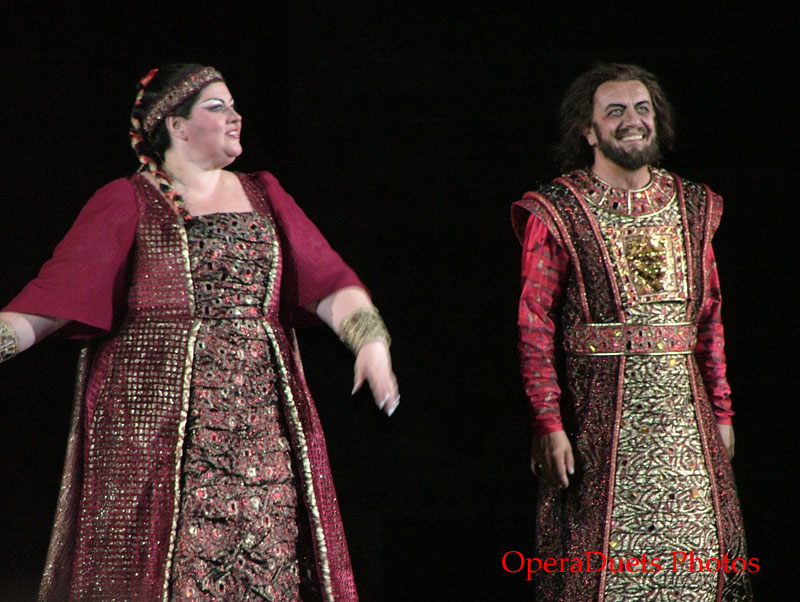
Arena
1 July 2005 - 21.15
Nabucco
Dramma lirico in 4 acts by Giuseppe Verdi
Libretto by Temistocle Solera
PRINCIPAL CONDUCTOR Vjekoslav Sutej
DIRECTOR Graziano Gregori
SCENOGRAPHER Graziano Gregori
COSTUME DESIGNER Carla Teti
Lucky for me it did not rain in the evening of Nabucco. It had been raining on June 29 and even thunders and lightning, the next day not so much. on July 1rst it was raining from the morning and then stopped. But in the evening the clouds again looked heavy, and when I came to Verona with the Opera Bus the clouds were hanging heavily and dark over the Arena. Then the time neared for Nabucco to start, suddenly the sky was clear.
The conductor Sutej was a wonderful opera conductor but although the overture was wonderful I remembered Jose Cura and his conducting of this overture as superior. This was a wonderful production but still even with Leo Nucci being a fantastic Nabucco an everything being quite OK I found the Nabucco in the Arena was no match to the Nabucco I have seen in Vienna State Opera. Susan Neves was an energic Abigaille who acted and sung with aplomb. Fenena and Ismaele was good enough, a true mezzo as Fenena was usual (I found) but wonderful. Giacomo Prestia was a good Zaccaria. But I missed the Vienna production that brought me to the heart of the matter in this opera, here I was on the outside looking in. The Va pensiero chorus was dacapo'ed. The audience loved it, and was especially fond of Leo Nucci, Giacomo Prestia and Susan Neves.
But whereas Miroslaw Dvorsky as Ismaele and Eliane Coelho as Abigaille in Vienna 2002 was something to remember, they were great, Nabucco in the Arena was more a big fuss than an opera.
Nabucco might seem perfect for an arena with its big chorus's but that makes the drama harder to unfold where as the intimacy of an opera house makes it more an emotional tour.
OD Travel + Photos
Posted by
operaduets
at
Saturday, July 01, 2017
0
comments
![]()
Labels: 07_July, 2005, Giacomo Prestia, GIUSEPPE VERDI, Italy, Leo Nucci, NABUCCO, Opera, Susan Neves, Verona
2007-06-29 Nabucco (Verdi), Arena di Verona
Nabucco = Leo Nucci
Ismaele = Fabio Sartori
Zaccaria = Carlo Colombara
Abigaille = Maria Guleghina
Fenena = Nino Surguladze
High Priest of Belo = Carlo Striuli
Abdallo = Carlo Bosi
Anna = Patrizia Cigna
Daniel Oren, conductor
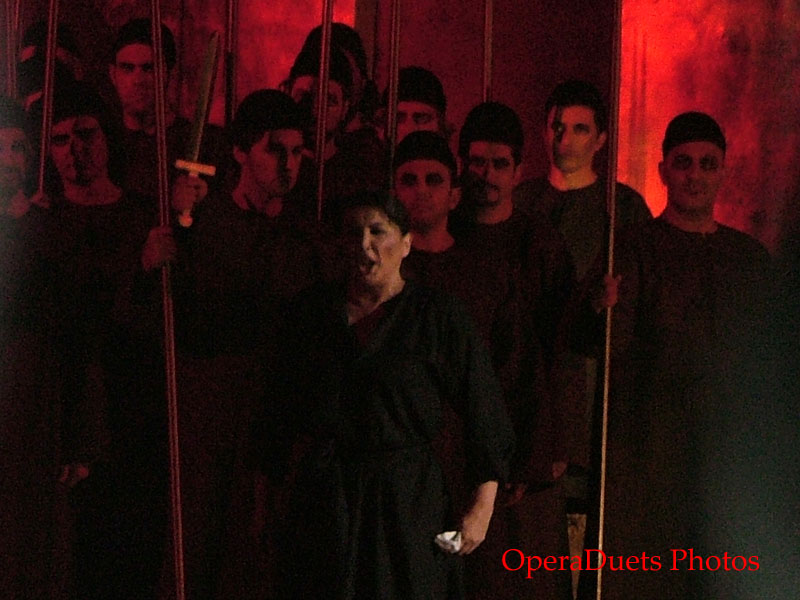
Nabucco
Dramma lirico in 4 acts by
Giuseppe Verdi
Libretto by Temistocle Solera
opera and synopsis
Arena
29 June 2007 at 21.15
Season Tickets
Principal Conductor Daniel Oren
Director Denis Krief
Scenographer Denis Krief
Costume Designer Denis Krief
Choir Master Marco Faelli
Director of the Corps de Ballet Maria Grazia Garofoli
Lighting Designer Paolo Mazzon
Director of stage design Giuseppe De Filippi Venezia
Orchestra, Chorus and technicians
from the Arena di Verona
Now Nabucco. Not the same production as two years ago. Leo Nucci was also then Nabucco and Susan Neves was Abigaille. Disappointment, two-fold; the production in 2005 was better, and my seat was better: I could hear better then, and no-one was talking during the show. Having read some review of the production with their pointing out disappointment towards Carlo Colombara and Maria Guleghina, they loved Leo Nucci, of course... so I knew something. And it was announced at the loud-speaker, that Colombara although slightly ill he was still singing. And you could tell he was not in top form but he was steadily better. Maria Guleghina was also weak sounding, but I think that was because of my seat. Had I been sitting in Poltronissimo God section and not (just) poltronissimo then I think my feeling had been better about this production, but I would still have found the ballet thing stupid and wondering why did they put such a boring costume on the wonderful soprano, Maria Guleghina. Fenena and Anna got something beautiful to wear. White for Fenena, red for Anna, but for Abigaille, dark earth colors.
And then singers did not come out where I was standing.
Must have more Maria Guleghina live. Especially as Abigaille....
OD Travel + Photos
Original blog post
Posted by
operaduets
at
Thursday, June 29, 2017
0
comments
![]()
Labels: 06_June, 2007, Carlo Colombara, Fabio Sartori, GIUSEPPE VERDI, Italy, Leo Nucci, Maria Guleghina, NABUCCO, Opera, Verona, Vienna
2004-06-02 I Vespri Siciliani (Verdi), Opernhaus Zurich
Elena = Paoletta Marrocu
Arrigo = Marcello Giordani
Procida = Ruggero Raimondi
Montfort = Leo Nucci
Carlo Rizzi, conductor
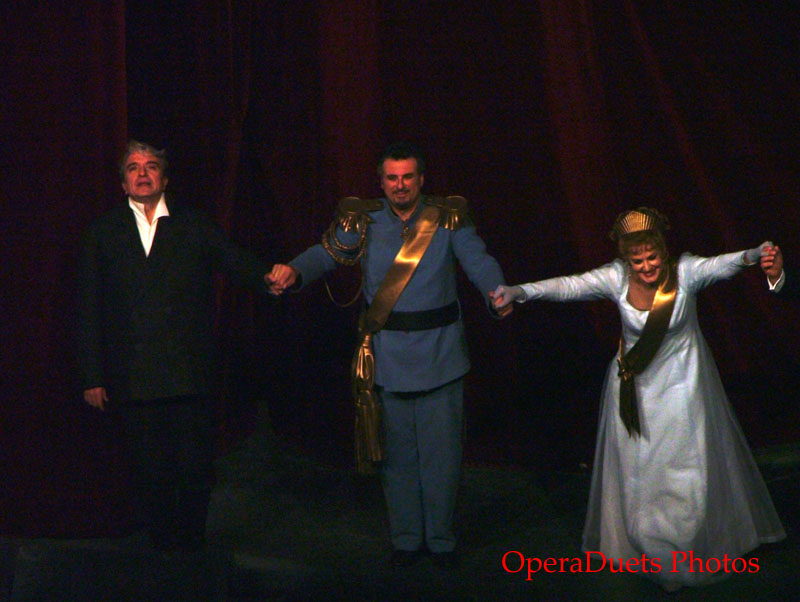
Mi 02 19.30-22.45 I VESPRI SICILIANI
Rizzi/Lievi/Balò/Raffelsberger
Marrocu, Schmid; Nucci, Raimondi, Giordani, Mayr, Groissböck, Winkler, Christoff, Murga, O'Reilly
Mittwoch-Abonnement B, Preise VI
2.6.2004 Nicolai Ghiaurov is dead! I did not know that he died in the morning when I came to the opera house for Verdi's Vespri Siciliani with Ruggero Raimondi, another star basso, as Procida. After the only intermission (before act 4), the indendant of Opernhaus Zurich Alexander Pereira came out, first he said nobody is sick, but the opera house has just received a call that the great basso Nicolai Ghiaurov is dead, he died this morning. The house sighed at this devastating news. Alexander Pereira then asked the audience to stand up for this great artist. And the house rouse up. And we all sat down as if we were only one body. The indentant told a bit of Ghiaurov's career in Zurich, and he said that the Opernhaus is dedicating this performance to Nicolai Ghiaurov.
The artists was all grieved by the loss, but nevertheless this two last acts was really fantastic sung and acted.
And now back to the beginning. The Overture of I Vespri Siciliani is a truly wonderful piece, and it brought back memories of the first 3 tenors concert, the original in Roma. I could see the images from the TV, and when the overture ended I almost waited that Carreras would come to sing Lamento di Federico. But instead there was another Lamento for Federico, Elena is mourning her brother. Paoletta Marrocu as Elena, maybe it was my ears that needed getting used to her voice or she sang better as the evening progressed, or both. Leo Nucci, Guido di Monforte, was really making a tremendously fine job in Vespri. It was a perfect role for him, his voice was really beautiful and his presence was tremendous. Marcello Giordani, Arrigo, was in the first 3 acts not in the best voice, but luckily in act 4+5 he was fantastic. Ruggero Raimondi, Giovanni da Procida, was wonderful but unfortunately in this opera all the characters is one-dimensional so it was only one side of RR, he was all revenge and patriotic. Before the intermission I thought that only the overture was highlight but luckily there were more "juicy" stuff in act 4+5.
All day long the skies were threatening with rain but the rain held until after the opera. Then the rain poured down. No waiting at the stage door for me, no umbrella and after all tomorrow I will have to get up early in the morning for a early flight to VIENNA and my second Italiana.
OD Travel + Photos
Posted by
operaduets
at
Friday, June 02, 2017
0
comments
![]()
Labels: 06_June, 2004, GIUSEPPE VERDI, Leo Nucci, Marcello Giordani, Opera, Paoletta Marrocu, Ruggero Raimondi, Switzerland, VESPRI SICILIANI, Zurich
2000-05-20 Pagliacci (R. Leoncavallo), Wiener Staatsoper
Canio (Pagliaccio) = Giuseppe Giacomini
Nedda (Colombina) = OIga Guryakova
Tonio (Taddeo) = Leo Nucci
Beppe (Arlecchino) = Herwig Pecoraro
Silvio = Geert Smits
Jun Märkl, conductor
Wiener Staatsoper
samstag, 20. mai 2000
63. Aufführung in dieser Inszenierung
Pagliacci
Drama in zwei Akten
Text und Musik von Ruggero Leoncavallo
Musikalische Leitung Jun Märkl
Inszenierung, Bühnenbild
und Kostüme Jean-Pierre Ponnelle
Chorleitung Ernst Dunshirn
Nedda (Colombina), seine Frau Olga Guriakowa*
(Olga Guriakova, Olga Guryakova, Olga Guryakowa)
Silvio, ein junger Bauer Geert Smits*
Erster Bauer Gerhard Eder
Zweiter Bauer Johann Reinprecht
Ort der Handlung Bei Montalto in Calabrien
Orchester und Chor der Wiener Staatsoper Eleven der Ballettschule der Wiener Staatsoper Gumpoldskirchner Kinderchor Bühnenorchester der Wiener Staatsoper
* Rollendebüt an der Wiener Staatsoper
After Cavalleria Rusticana with Agnes Baltsa, this opera was just not IT. Giuseppe Giacomini as Canio was rather boring. Olga Guryakova as Nedda was good enough. Leo Nucci was a delight as Tonio. Nothing more to say, really...
OD Travel
Posted by
operaduets
at
Saturday, May 20, 2017
0
comments
![]()
Labels: 05_May, 2000, Austria, Giuseppe Giacomini, Leo Nucci, Olga Guryakova, Opera, PAGLIACCI, RUGGERO LEONCAVALLO, Vienna